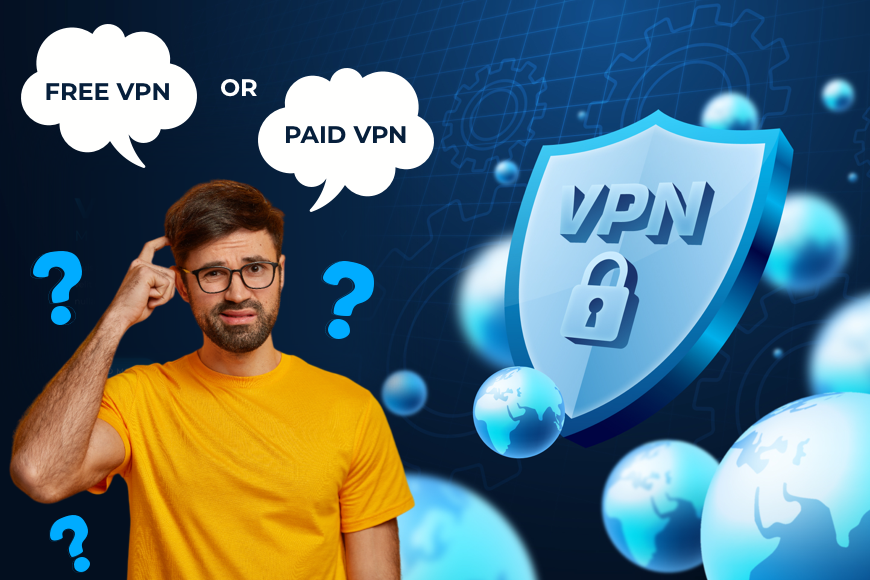In a world that is getting more and more digital, and where our reliance on the Internet is only growing, protecting our online security has become essential. Using a VPN is a practical and proactive solution to protect our identities and encrypt network connections. But selecting the best VPN solution could be challenging given the large number of options available.
As many consumers are drawn to the idea of safeguarding their online behavior without spending any money, the appeal of free VPN services further complicates this decision-making process. This begs the question of whether or not free VPNs compromise our security in exchange for a service that is provided without charge.
Are free VPNs truly free, or is there a catch?
Although it can be hard to resist the attraction of ‘free’, there is no such thing as a free lunch, as the phrase goes. You may not have to pay a membership price with a free VPN, but they frequently include restrictions or additional expenses that can affect how you use the internet.
With Free VPNs there is almost always a catch due to the way they operate. They look for alternative ways to make money because they don't charge users directly. Selling user data to third parties for targeted advertising or other purposes is one example of this. In essence, you can end up being the product, with your online habits and private data being commercialized without your knowledge or approval.
Furthermore, there are frequent restrictions on the functionality of free VPNs. These restrictions could be anything from a constrained server count to slower connection speeds, constrained bandwidth, or even data quotas that limit your usage. Such restrictions can significantly impede your online activity, making it difficult to stream material, access websites that are only available in a certain region, or perform bandwidth-intensive jobs.
Lastly, the security and privacy protections given by free VPNs might not be as strong as those supplied by their premium counterparts. Despite the fact that some free VPNs may advertise the usage of encryption and security procedures, it is often unclear how effective and robust these safeguards actually are. This can negate the very purpose of utilizing a VPN to protect your online security by making your data open to interception and compromise.
Privacy pitfalls: What you need to know about data handling
The cornerstone of internet security in the world of VPNs is privacy. However, a complicated web of privacy traps exists underneath the surface and demands our attention. You might want to take a look at three factors to stay ahead.
Log-keeping:
Even while you're connected to a VPN, some VPN companies record your behavior. Your IP address, the websites you've visited, and even the volume of data you've moved may be included in this. It's crucial to select a VPN company that doesn't store logs.
DNS leaks:
Even when you're connected to a VPN, a DNS leak happens when your device sends unencrypted DNS requests to your ISP. This could give websites you visit access to your true IP address and location. Make sure your VPN provider uses DNS over HTTPS (DoH) or DNS over TLS (DoT) to prevent DNS leaks.
Malware:
There have been instances of VPN software being released via Google Play Store and Apple App Store while being infected with malware. These apps have the ability to steal your browsing history, credit card information, and login credentials. Download VPN software exclusively from reputable websites to keep yourself safe.
Why are paid VPNs worth it?
Paid VPNs are a better security investment. They provide more servers, stronger encryption, and a better track record of privacy. Premium encryption protocols are used by paid VPN services to strengthen your online fortress. They build a solid wall against prying eyes with features like AES 256-bit encryption. Your data will stay protected and inaccessible to unauthorized parties because of these cutting-edge encryption technologies.
Paid VPNs have enormous server networks that let you bypass borders and access things from all over the world. These networks provide a large number of carefully placed servers, enabling you to get around regional limitations and have free access to the content you want.
Speedy transmission is one of the distinguishing features of premium VPNs. Paid VPNs make significant investments in reliable infrastructure and bandwidth, which guarantees that your online experience remains uninterrupted. In contrast to their free counterparts, which frequently encounter poor performance owing to overloaded servers.
Paid VPNs offer new-age capabilities that go above and beyond to improve your VPN experience. Split tunneling, kill switches and leak prevention are a few features that provide your VPN connection an additional layer of security and personalization. Last but not least, paid VPNs provide professional customer care that is accessible to address any problems or issues you may experience when it comes to technical assistance and debugging.
Free or paid VPNs: The final verdict
Weighing the advantages and disadvantages will help you decide between free and paid services. Free VPNs may be alluring due to their low/no cost and simplicity of setup, but they have restrictions and may cause privacy issues. Paid VPNs, on the other hand, come with a number of benefits that make them worth the money.
Free VPNs are reasonably easy to set up and offer basic functionality without the need for a payment card. However, they frequently place limitations on data usage, leading to constrained capabilities. In comparison, paid VPNs provide limitless data usage, fast connections, and a greater variety of servers throughout the world. Paid VPNs guarantee the anonymity of your data and shield your online activity from prying eyes with better security features.
Free and paid VPNs both have their uses, but the judgment is more in favor of paid VPNs. A premium VPN is the best option if security, speed, and a wide range of functions are important to you. Because not all VPNs are made equal, it's crucial to conduct your research and pick a reliable provider who offers services that suit your particular requirements.
TunnelBear, Windscribe, and ProtonVPN are a few popular free VPN choices. However, paid VPNs like NordVPN, ExpressVPN, and Surf Shark have proven to be dependable options for VPN experts.

